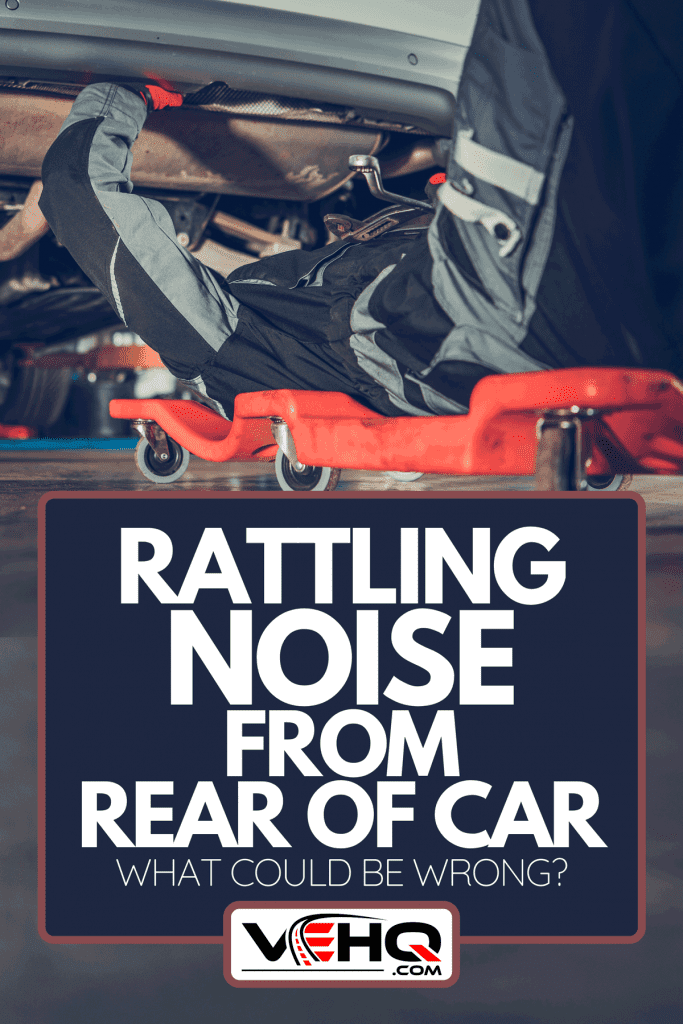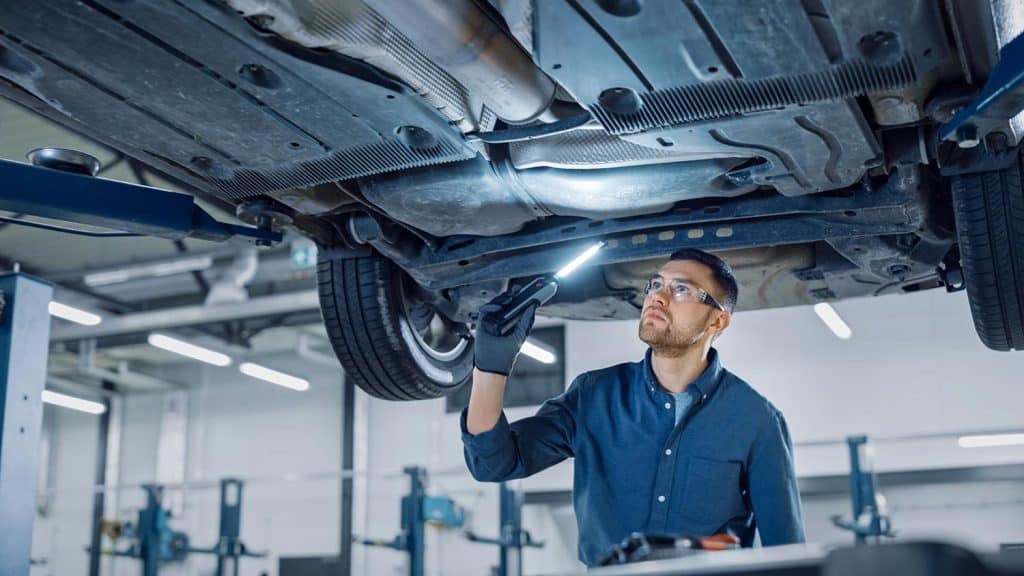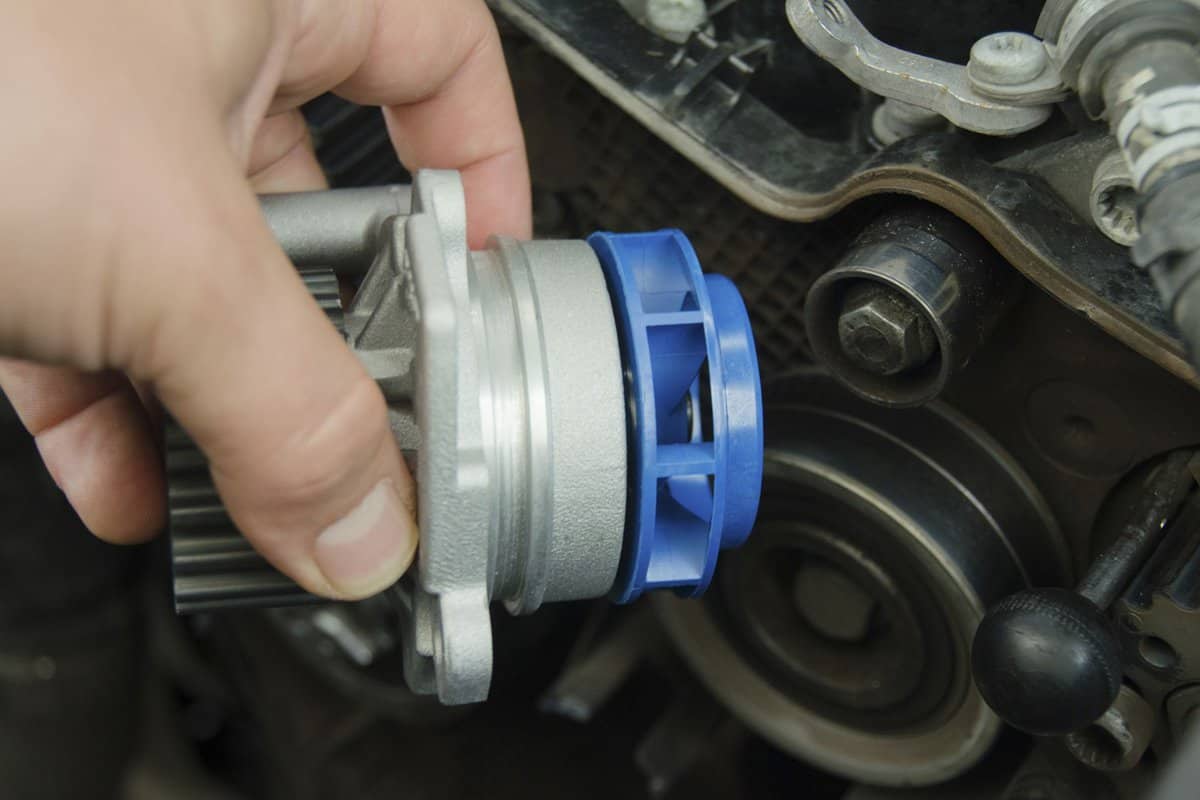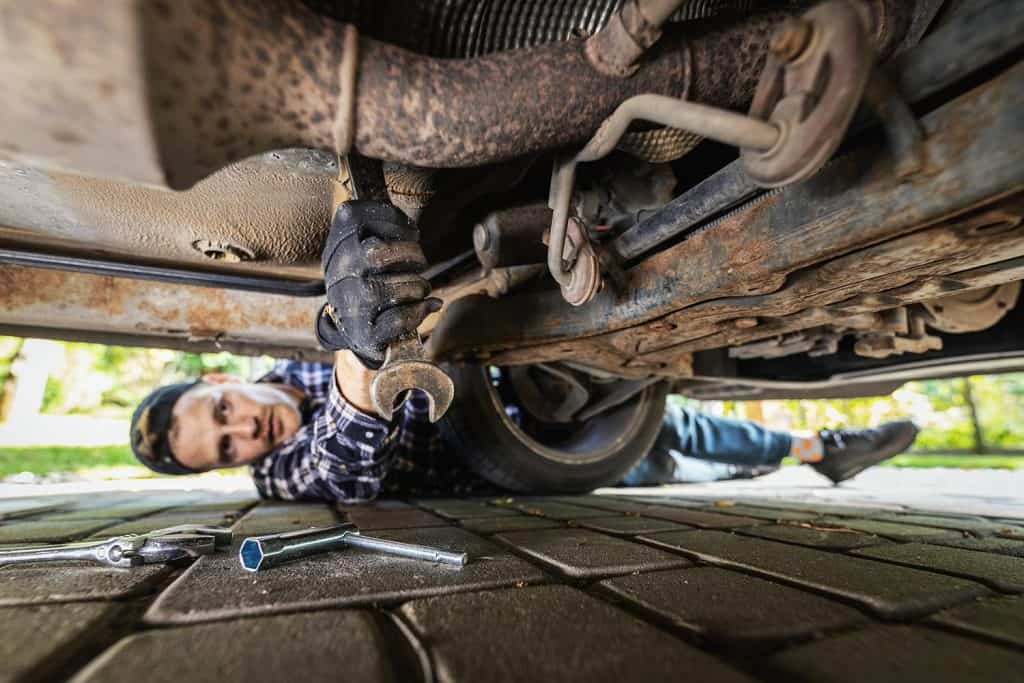If you hear a rattling noise coming from the rear of your car, then it can wave some red flags. However, unless you are well learned in automotive mechanics, it can be confusing why this rattling noise happens. So, what could be wrong? We have researched rattling noise causes to give some ideas as to why this might happen at your car's rear.
If you hear a rattling noise from the rear of your car, it could be due to issues with the following:
- Corroded exhaust pipes
- Worn suspension
- Faulty catalytic converter
- Worn wheel bearing
- Bad muffler
- Bad transmission mounts
- Worn window channels
- Water pump failures
- Worn brakes
- Worn struts and shocks
- Bad axels
- Bad wheels or tires
While this seems like a long list of possible culprits, it is essential to know the functions of each to understand why they could be causing a rattling noise. This article will look at each of these vehicle parts and explain the issues in more detail. In addition, we will talk about safety precautions to take when you hear a rattle, so read on!

[toc]
Rattling Noise From Rear Of Car—What Could Be Wrong?
No matter what vehicle you drive, sooner or later, there will be issues with it that need to be addressed. One of them could potentially be a rattling noise from the rear of the car.
It's not uncommon for vehicles, especially older ones, to have a rattling when being driven. What could cause the issues? Let's take a look at the most common reasons:

Corroded Exhaust Pipes
Corroded pipes are some of the most common culprits to rattling noises in vehicles. When pipes begin to rust, it can cause a rattling sound.
However, sometimes this sound can be mistaken for a muffler issue when the vibration is coming from the exhaust pipe near the gas tank. Our recommendation is to check these pipes thoroughly for corrosion and if there is any rust on them, have them replaced.
Worn Suspension
Another problem that some vehicles experience is worn suspension. The suspension helps keep the car balanced and can play a significant role in driving quality. However, if this suspension wears, it will cause some rattling on bumps and rough car rides.
Faulty Catalytic Converter
Another reason for this noise could be due to a faulty catalytic converter. The catalytic converter helps get rid of pollutants from your car's exhaust system.
If it gets clogged due to carbon build-up, it can cause a rattling noise in the car's rear. The only way to check if this is an issue would be to remove and inspect it for damage.
Worn Wheel Bearing
A bad wheel bearing could cause rattling noises when driving your vehicle. If this bearing goes out, it can cause a metal-on-metal sound that causes the rattling.
This problem needs to be addressed by an automotive specialist immediately. If you drive for too long with this issue, it can potentially damage the axle and lead to other problems such as bad alignment and low tire pressure.
Bad Muffler
One of the common issues that we see with cars is a bad muffler. If the pipes are expanding due to corrosion or other issues, then this could cause your car or truck to make a rattling noise as you drive.
It is vital that if this sound is happening, you get it inspected and repaired right away because driving with it can lead to problems like water pump failure and transmission malfunction.
Faulty Transmission Mounts
The transmission mount is an integral part of your vehicle as it keeps the transmission in place. If it goes bad, then this can cause a rattling noise but not always immediately.
Sometimes it happens gradually, and by the time you notice, there could already be extensive damage to your car's engine. So make sure you check them from time to time and have your mechanic look for bad ones if they need to be replaced.
Worn Window Channels
Over time, window channels can warp, which can cause a rattling noise as you drive your car or truck.
When this happens, a qualified technician will need to be repaired immediately because driving with this issue can lead to more problems like bad alignment, lack of tire pressure, or even electrical malfunctions.
Water Pump Failure

This is one of the most severe issues that can happen with your car's engine if not taken care of immediately. Basically, there are two types of water pumps on your vehicle - an electric pump and a mechanical belt drive pump.
The electrical ones can be somewhat quiet, but the belt-driven one is much louder if it goes bad.
Depending on how old your car is, you might want to check up on them yearly and ensure that they are functioning correctly; otherwise, this noise could lead to even more expensive repairs later down the line.
Worn Brakes
If your brakes are worn out, then this can cause a rattling noise as well. When you hear the sound, it usually comes from the front of the car or truck and can be felt when coming to a stop.
This issue should also be addressed by an automotive specialist immediately so that it doesn't lead to poor performance of your vehicle.
Worn Struts and Shocks
A worn-out strut or shock will need replacing immediately, if not sooner. When these parts wear out, it can cause the car to shake when you drive it and could lead to other problems such as poor tire wear, alignment issues, and bad wheel bearings.
Bad Axles
If your axle is bent or broken, then it can cause this rattling noise to happen as well.
However, it might not be visible, so you might want to have your mechanic inspect them regularly because once it happens, you will need to replace the whole assembly, which means an expensive repair bill.
Faulty Tires or Wheels
If your tires or wheels are out of balance, then it can cause a rattling noise as you drive. If not addressed immediately, this can lead to problems like alignment issues that could potentially damage your car's suspension and other parts.
How do I find the rattle in my car?
If you're concerned about the rattling noise in your car, then you need to take it to a mechanic as soon as possible because driving with this issue can lead to even more problems.
However, if you want to try and find the source yourself first, here are some ideas:
Look under the hood
A rattling noise could come from the engine, transmission, suspension system, or even wheel bearings. So soak up some time by looking under the hood yourself could save you a lot of money in the long run.
Inspect areas closely for any belts, valves, or gaskets that look loose or worn. Even without a mechanical eye, you might spot something that looks damaged to better direct your mechanic toward the issue, saving costly hours of labor.

Listen to your car
While driving around or after you stop, put your ear to different parts of your vehicle and see if you can spot where it's coming from. You'll want to keep the radio and any heating or cooling fans in the cabin turned off while driving to keep it as quiet inside as possible.
Ask neighbors and friends
Sometimes, they could help you pinpoint the noise source by telling you where it's coming from or what type of symptoms their vehicle had when it did this. Ask someone to listen and observe your car while you drive it in their vicinity.
Look online
The internet will give you even more information on determining this yourself, like searching for up DIY videos on YouTube. For instance, a visual guide might help you identify and even repair the issues. Check out the video below, for instance, on a rattling exhaust diagnosis and repair.
Can an alternator make a rattling noise?
Yes, an alternator can make this sound if it goes bad. Generally, the noise happens due to loose bearing within the alternator itself.
An alternator is a device that produces alternating current from a power source. It creates electricity from the torque of a rotating engine. So without it, you more than likely aren't going to make it to your destination!
Can bad spark plugs cause rattle?
Yes, bad spark plugs can cause a rattling noise or a ticking noise. It will usually be noticeable during idle or when the car is just starting up. It might sound like something is loose inside your engine or that you have some exhaust issue.
A spark plug fires an electric current to ignite the gas within your vehicle's combustion chambers and helps it run. So if you have a bad spark plug, we'd suggest an immediate replacement, so they don't lead to more significant problems down the line!
Is it safe to drive with a rattling exhaust?
No! It's never safe to drive with a rattling exhaust because there could be various parts of your vehicle that are loose and might fall off. In addition, driving with a rattling exhaust could lead to decreased performance, misfires, and even stall out on you.
How do I fix the rattling noise in my car?
Honestly, the best way to fix the rattling noise in a car is to go to a qualified mechanic who knows how to diagnose the problem. However, you can troubleshoot the issue yourself by checking the list in this article with the aim to save time and money while your car is at the shop for repairs.
Nonetheless, a mechanic has the right tools and equipment to find the source of the issue. This way, you don't spend money on parts or labor that won't fix it.

Final Thoughts
Overall, if there is a rattling going on from the rear or anywhere on your vehicle then there is an issue that needs to be addressed. The reason as to why this is happening could be moderate to severe. Either way, it is important not to wait long before having it checked out!
If you like this article, then you should also check out:
Do Tires Need To Be Balanced When Rotated?
